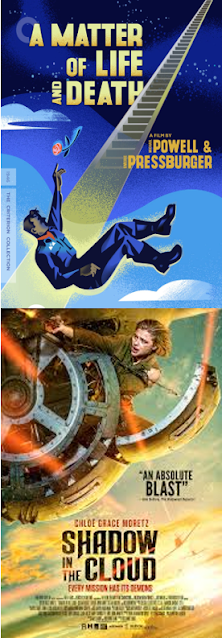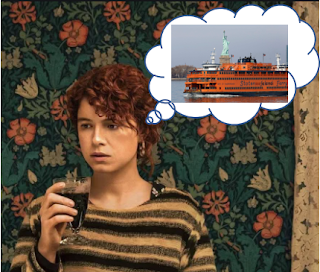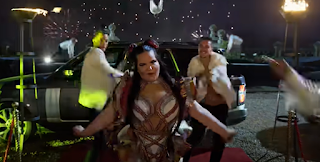It might seem like sort of a random film to single out this way, and trust me, the reason it is a landmark film is not a good one. But it had good consequences.
Simply put, this may be the last big mainstream release in which most of the white characters were good and most of the Black characters were bad.
It's the movie I automatically think of when I consider the idea of why we no longer see African-American characters that are just plain evil. And I hadn't even seen it until Friday night.
Street Smart spoilers to follow.
If you have no familiarity with this film, it's the one where Christopher Reeve plays a New York City magazine journalist who has run out of interesting ideas, and his editor looks like he's giving up on him. So he gets the idea to profile a pimp, a day-in-the-life kind of thing, and his editor gives him enough rope to hang himself, as well as a strict deadline for submitting the piece. When the journalist (Jonathan Fisher by name) strikes out on getting in touch with any actual pimps, he fabricates the story and turns it in, at which point both it and he become a sensation.
Meanwhile, a pimp played by Morgan Freeman -- Leo Smalls Jr., who goes by the name Fast Black -- has been accused of murder. In reality, he roughed up a john in a not-very-extreme fashion -- just a kick in the balls and a kick in the face -- but the john (who was more than deserving) goes and has a heart attack. Even though the pimp in Fisher's profile goes by the name Tyrone, people who know Fast Black assume the piece is really about him, as Fisher happens to have stumbled on some details that are similar between his fictitious pimp and Fast Black. Both attorneys in Fast Black's trial believe that Fisher's notes will prove vital to the case, only, of course, there aren't any.
The reason I knew about this movie long before I saw it was that I remember the review of it they did on Siskel & Ebert, way back in 1987. Or thought I remembered it, anyway, but more on that in a minute.
In the review, they discussed how uncharitable it was that the film features no positively portrayed Black characters, and that the characterization of Freeman as Fast Black was particularly problematic. By "uncharitable" I suppose you could say "racist." The other Black characters are a driver/sidekick (Erik King), a business partner/wife? (I couldn't be sure) (Anna Maria Horsford) and one prostitute who factors into a couple scenes (Shari Hilton). None of them have a heart, though I suppose the prostitute comes closest.
The white characters get off comparatively easily. Some are a bit buffoonish, like Fisher's editor (played by Andre Gregory), but Fisher's wife (Mimi Rogers) and the white prostitute (Kathy Baker) are more good than bad. The lawyers are white but are not portrayed as negatively as the Black characters.
The real problem, though, is Reeve's Fisher. He's the protagonist so he is supposed to be the hero of the piece, but his decisions make him difficult to root for. For one there is the fabrication of his story, a core violation of journalistic ethics that will end his career if he's discovered. Although the film shows him staring blankly at his computer screen (one of those great old computers where the screen is just green writing against a black backdrop), we don't really see him agonize over the decision to make up a story.
He is similarly blithe when he decides to randomly cheat on his loving wife with Punchy, the prostitute played by Baker, who met Fisher in an earlier scene when he was trying to find a pimp to interview. As I was watching their second scene together and could tell where it was going, I was almost shocked to see it actually go there. Fisher has had no fight with his wife that would "justify" this betrayal -- explain it, maybe -- and instead, he just descends into sex with the prostitute with a crooked grin on his face, like it means nothing to him emotionally. (This is also only a few minutes in the narrative after a scene where he puts his wife in harm's way at a club, when she is roughed up by a thug and he does nothing to intervene.) Simply put, if our protagonist is going to cheat on his wife and retain our sympathies, we need to at least see him wrestling with the choice, like it's a fatal flaw overwhelming him. It can't mean nothing to him.
What may be even worse about this is the aftermath. After the story actually connects him up with Fast Black, Fisher takes him and Punchy to a fancy party thrown by his editor, where the film makes a little comic hay out of the interactions between New York socialites and the pimp world -- comic hay, I should say, that is wildly inconsistent with the tone of other parts of the movie. At this party, Fisher's wife is also present, and she sees him recklessly flirting with Punchy, standing too close and both eating the same shrimp from either end until their mouths are touching -- wearing that same crooked grin as just before he slept with her, a grin that damns the consequences. The fact that he feels no guilt over having slept with her, and is also so shameless as to parade this in front of his loving and supporting wife, who has done nothing wrong, is basically disqualifying from the standpoint of our sympathies.
The reason I'm telling you all this is that the movie does not punish Fisher. He does not lose his job. He does not lose his wife. In fact, the very final scene is him continuing to do the job of TV reporter that he got after his artificial pimp piece went the 1987 equivalent of viral. He's soberly reporting on the consequences of the pimp life and the resulting street justice, in a scene where Fast Black has just been gunned down by his driver, the former dead and the latter led away to jail, while Fisher gets off scot free. (And Fisher was the one artificially orchestrated the conflict that put the two at odds with each other.)
Fast Black, meanwhile, is consistently violent, sometimes murderously so. The film starts out with the right approach to his character, showing him completing his duties as a pimp by protecting his prostitute and roughing up the john. He does it almost reluctantly, and when the john succumbs to his heart attack, he actually seems concerned in a way beyond his own culpability. He tries to wake the john up and only flees the scene when it's hopeless, knowing he won't be able to explain what has happened.
This is the last time Fast Black shows a reasonable amount of compassion or restraint. He roughs up a fellow basketball player simply for playing defense on him. He slaps around Punchy and other prostitutes. He flies off the handle at the smallest provocation. He ultimately kills Punchy when he believes (correctly) that she's betrayed him to the prosecuting attorney. The only "positive" aspects to his portrayal are that he can be jovial when he wants to be, and that sometimes he walks himself back after his temper gets the better of him. But this is clearly not a character with an underlying good nature who is fighting his darker instincts. He's a murderer and a bad seed.
This would be okay if there were another Black character who offset his portrayal, but there isn't.
It's funny, because my wife and I were just talking about this before I watched Street Smart. We had just finished the fifth episode of the first season of The Boys, which we are loving -- those five episodes have all come within the past week, one per night with only one night off. We were talking about the tricky portrayal of A-Train (Jesse T. Usher), the African-American "supe," who is a real scumbag but is not primarily a violent scumbag. We talked about how a portrayal underlying the character's violent nature might be problematic from a racial standpoint, but also that they could afford to make A-Train a bad character because there was a good Black character off-setting him, Mother's Milk (Laz Alonso).
Street Smart is the reason screenwriters are aware of the need to give a balanced portrayal to minority characters. You can't have all the white characters be good, comparatively speaking, and all the Black characters be bad. It just leaves a bad taste in your mouth. It's icky.
The reason I watched Street Smart on Friday night was to see this last relic of our previous era of racial tone deafness. It wasn't inspired by our viewing of The Boys, as I stumbled across it on Stan and only went with it after going through all 300 of the "recently added" titles first. I wanted to see for myself what it was that Siskel and Ebert had so objected to, just how badly the filmmakers had messed this one up, just how instructive it was to future generations of screenwriters.
The verdict, I should say, is "pretty badly." However, maybe not as badly as I thought, and that's probably due to the skill of Freeman. As problematically as he is written, he's actually giving a great performance, which the Academy recognized via an Oscar nomination for best supporting actor. You put a lesser actor in that role, though, and I think the movie's core racial problems are even more underlined.
Here's the final funny thing about this, though. Roger Ebert actually liked this movie, and he says nothing in his review about problematic portrayals of Black people.
Here's the review if you want to read it. He actually gives it three stars, and I believe that's out of four, making it an even stronger assessment than today's more common three stars out of five would be.
Memory is a funny thing. Maybe Siskel was the one who hated it, though I can't find anything about that on the web. I swear I remember seeing the footage from the movie on their show (it's the scene where Fast Black beats Fisher and holds a gun to his face), and them talking about the racist undertones of the movie.
But maybe I didn't. Maybe I heard somebody else discuss the problematic racial aspects of this film, and conflated that with my memory of Siskel and Ebert reviewing it. I suppose that is most likely, as Siskel and Ebert would have been part of the cloud that hung over all of us back then, when we did not so easily recognize problematic racial politics that are clear as day today.
In any case, my false memory does not change the problematic nature of this movie. It's maybe not as awful in that regard as I thought it would be. But it also has poor execution, extreme believability issues and wildly inconsistent tones that still make it a very sub-par cinematic experience.
And I do think that 1987 represented about the last time movies could, with impunity, depict Black characters so negatively. Of course, this increased sensitivity to the portrayals of minority characters has sometimes gone too far in the other direction, as it's been responsible for a different type of hurtful stereotype: the "magical Negro," a character so good and saintly that in some cases he or she actually has supernatural powers. (The prime example of this seems to be Michael Clark Duncan's character in The Green Mile.)
But it's definitely a good thing that we no longer get movies with evil Black pimps as the primary antagonist. There could be, and certainly have been, Black pimps in movies that have come out since then -- maybe even evil Black pimps. But if there are, you can be sure that there is also one, if not two, really good Black characters as cops, or as lesser criminal figures who have a change of heart that reveals their underlying moral compass. Though really, I don't think you would see a Black pimp in a movie at all nowadays, and it's probably been that way for at least 20 years.
And by contrast, a white protagonist with as many flaws as Jonathan Fisher would never be able to emerge relatively unscathed from a movie made today, unless the whole point were a satirical one, about how his white privilege allows him to escape the consequences of his poor moral choices. If I believed Street Smart were trying to do that, rather than just having its head in the sand, I might find it a whole lot smarter.































